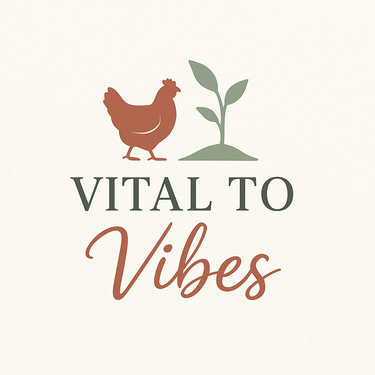What’s the #1 Homesteading Skill You Need—and How to Master It
Ready to start your homesteading journey but don’t know where to begin? This printable Homestead Starter Sheet walks you through the 5 essential steps to start your journey with intention and confidence — no experience needed! Get focused, get organized, and start growing your dream life today.
Nicole
7/1/20253 min read


When you type “homesteading” into Google, one question keeps popping up again and again:
“What’s the most important skill I need to live a homesteading lifestyle?”
With rising grocery prices, suburban gardeners, DIYers, and caretakers (like you!) are all asking: “Can I do this without being a farmer?” The short answer? Yes. But there's one skill that trumps everything else: planning with purpose.
Common Mistakes Modern Homesteaders Make
Diving into every project at once — buying animals, starting large gardens, building coops, and canning—without assessing time, resources, or priorities.
Not having a clear WHY — starting projects based on social media FOMO instead of real goals or needs.
Skipping the small steps — thinking you need acres to begin, or you must do everything perfectly from day one.
These mistakes often stem from believing that homesteading is either all or nothing.
The False Beliefs That Set You Back
“I need a big property to homestead.”
“If I can't grow everything from scratch, it's not worth it.”
“I don’t have time, so I’ll never succeed.”
These beliefs lead to overwhelm, burnout, and rarely lasting change.
The Better Framework: “Start Small, Plan Big”
The real homesteading secret?
Start with intentional planning that centers your values, space, and lifestyle.
Instead of doing it all now, do the most meaningful things first.
This method is powerful because:
You work in alignment with your family’s real needs (saving money? raising food? involving kids?).
You create incremental wins that build confidence.
You find a sustainable rhythm that fits within life’s real ebb and flow.
Why This Works—and What Happens Without It
With planning, you avoid wasted time, money, and emotional energy.
You grow clarity, confidence, and measurable progress.
You prevent burnout and maintain long-term momentum.
Skip the planning? You risk jumping from one half-finished project to the next—and giving up before you even see results.
A Story You’ll Relate To
When I first dreamed of backyard food security, I started three garden beds, signed up for a chicken coop kit, and bought a pressure canner—all in one weekend. My house was chaos, my to-do list exploded, and I ended up with half a bed planted and two unused gadgets collecting dust.
The following year, I slowed down. I asked myself:
Why am I homesteading?
What can I actually manage this year?
What will make the most immediate impact on my family?
Those questions led me to plant one raised bed focused on salad greens and build a small, manageable coop. That spring, we harvested every week and collected eggs every day. Finally, I felt like I was living alongside homesteading, not drowning in it.
The “Start Small, Plan Big” Method: Step-by-Step
1. Clarify Your Why
Ask: Why homestead?
Save money?
Eat healthier?
Teach my kids responsibility?
Be more eco-conscious?
2. List Possible Projects
Examples:
Small raised bed for salad greens
A mini coop with 3 hens
A canning routine or compost system
Seasonal DIY projects
3. Assess Your Capacity
How much time weekly can you dedicate?
What’s your budget this season?
What support do you have?
4. Prioritize & Choose One
Pick the one project that aligns with your why and matches your capacity.
5. Plan the Project
Sketch the garden or coop layout
Set start/completion dates
Identify supplies & steps
Schedule check-ins to assess progress
6. Execute Mindfully
Do the work one small step at a time. Celebrate each milestone—even planting the first seed or finishing coop insulation.
7. Reflect & Iterate
At season’s end, ask:
Did it meet my why?
What needs adjustment?
What’s next, or what stays?
Action Steps You Can Take Now
Over coffee, answer: Why am I homesteading?
List 3 realistic projects you could start this season.
Identify which one fits your time, space, and budget best.
Sketch a simple plan with dates and materials.
Begin—this week, even with a container or a chicken starter kit.
Freebie: “Your Intentional Homestead Starter Sheet”
Download my printable worksheet to:
Clarify your homestead mission
Choose one manageable project
Map out your season step-by-step
Track your wins
👉 Download the free Intentional Homestead Starter Sheet
Final Thoughts
Homesteading isn’t about perfection or doing it all. It’s about making purposeful progress—something that fits your family, your values, and your real life.
If you're finally ready to build a homestead that works for you—not one that overwhelms—you’re in the right place. Let’s do this together, one intentional step at a time.
Here’s to living simply, growing wildly, and vibing fully.
Until next time,
Nicole
Connect
Nicole@vitaltovibes.com
Let’s Grow Together—follow us!
